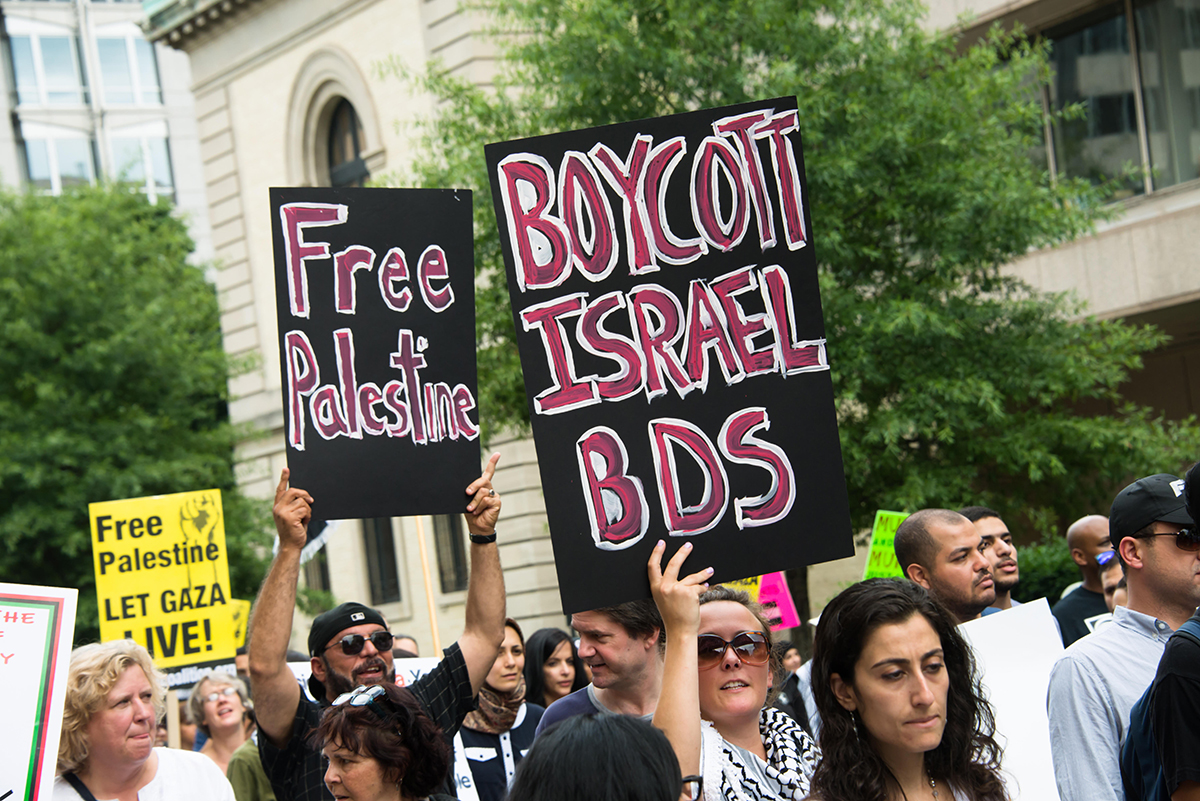BDS
Are Anti-BDS Laws an Assault on Free Speech?
Pluralism has been curiously absent from the BDS debate, which is currently gridlocked over the more narrow question of state neutrality.

Last month, Senator Marco Rubio introduced the “Combating BDS Act”—“S.1,” for short—which, if passed, would enshrine the right of state and local governments to boycott companies that boycott Israel. “The purpose of this law is to say…that we, Congress, are giving the states permission to do this,” David Bernstein told Vox, clarifying that under S.1 a state could forbid government contracting with such companies and not risk legal trouble because of it. (Since federal law supersedes state law, and Congress controls foreign policy, courts could theoretically argue local antiboycott laws violate the constitution because Congress has not officially sanctioned them. S.1 would change that.)
The act came hot on the heels of a report by The Intercept that a Texas speech pathologist had lost her job after she refused to sign a pro-Israel “loyalty oath”—allegedly a condition of employment in 26 states, with similar laws pending in another 13. This, of course, was somewhat exaggerated. Though several states do restrict contractors, including sole proprietorships, from boycotting Israel, nowhere is support for BDS criminalized, much less support for Israel required. As Eugene Kontorovich explained in The Washington Post:
Current law [already] prohibits U.S. entities from participating in or cooperating with international boycotts organized by foreign countries. These measures, first adopted in 1977, were explicitly aimed at the Arab states’ boycott of Israel, but its language is far broader, not mentioning any particular countries. . . .It is the conduct that matters, not the ideology. [My emphasis.]
The so-called loyalty oath, in other words, was little more than a specification of existing law, which prevents firms from acting in ways that undermine U.S. foreign policy. And the Texas speech pathologist wasn’t fired because of her political views; she was fired because, as a contractor for the state, she wouldn’t certify her compliance with state regulations.

That such rules are gaining traction now, almost five years after the last major offensive in Gaza, probably owes to the fact that several countries, most recently Ireland, have taken steps to outlaw the purchase and sale of goods produced in Israeli settlements, thereby increasing pressure on U.S. multinationals to boycott Israel. The logic here is straightforward: If a firm has operations in both Ireland and the U.S., and Ireland makes doing business with Israel illegal, the firm has a strong incentive to divest from Israel on pain of violating Irish law. But if the U.S. makes it illegal to obey Irish law, the firm’s incentive structure changes—as does Ireland’s, which now has an incentive to repeal or not enforce the law if it doesn’t want to lose investment.
Viewed in this light, anti-BDS laws are essentially trade restrictions in the public interest, part of a broader economic strategy for helping our allies and isolating our enemies. There’s also a sense in which they’re preemptive, a means of discouraging other nations from putting pressure on American businesses.
Fair enough—at least from a legal standpoint.
But the speech concerns are still important, and worth scrutinizing, insofar as they illustrate a distinction that’s often elided in our politics: the difference between neutrality and pluralism.
“Neutrality,” as I am using the term, is a quintessentially negative concept. It describes agents and procedures that do not promote a particular end or worldview, and is typically bound up with liberal notions of freedom and non-interference. Pluralism, by contrast, is a positive concept that describes a particular kind of society, one in which different groups with different values coexist and tolerate each other. The two are not the same: An organization might be neutral without being pluralistic (i.e. it might be indifferent to the beliefs of its members, all of whom just happen to think the same way), and a state might be pluralistic without being neutral—see, for example, the Ottoman Empire, which enjoyed a high degree of religious variance despite being a Muslim Caliphate.
That said, there is a link. Neutrality can enable pluralism by removing cultural and institutional constraints on human freedom—by allowing, as Isaiah Berlin once put it, “a plurality of ideas…of cultures and of temperaments” to flourish unencumbered.
But if this is a case for neutrality, it is at best an instrumental one—non-intervention guarding difference. Which begs the question: Why care about pluralism at all?
One answer, popular in progressive circles, is that diversity is a good in itself—that exposure to different values enriches human life and strengthens civil society. Another, and in my view more plausible answer is that suppressing disagreement just makes disagreement more dangerous, as perpetually insecure factions vie for the apparatus of state suppression. In extreme cases, this rivalry begets violence (the Thirty Years war, for example), but it causes plenty of problems in liberal democracies as well, where populist figures across the West have ridden a we-can’t-talk-about-this zeitgeist to power, eroding norms and liberties along the way. Think Trump, think Orban—and if Brexit goes awry, perhaps Corbyn too.
Yet the idea of pluralism has been curiously absent from the BDS debate, which is currently gridlocked over the more narrow question of state neutrality. An ACLU memo called Rubio’s bill “contrary to the spirit and letter of the First Amendment,” while The Intercept described it as “Israel-defending” and “free speech-punishing”—a content-based restriction on what you can say, rather than a procedural constraint on how you can say it. Then of course there’s Rubio himself, tweeting that his bill “doesn’t punish any political activity. It protects the right of local & state [governments] that decide to no longer do business with those who boycott #Israel.” Each side, in essence, has sought to position itself as the real champion of negative liberty—with BDSers sticking up for the right to boycott Israel, and their opponents sticking up for the right to boycott BDS.
That is to say, each side has missed the point.
The problem with Rubio’s argument is that it assumes a sharp or at least not terribly fuzzy line between economic conduct and political speech. Even if you accept that separation—and, for the record, many people do not—economic conduct clearly can be a form of self-expression, a way of living one’s commitments instead of just speaking them. Consider the ongoing fracas over Planned Parenthood—in particular, the assertion that taxpayer funding for abortion effectively forces religious groups (and some non-religious ones) to betray their principles. Analytically, the BDS complaint is very similar. In both cases, the state requires citizens to undertake a certain kind of economic activity—paying taxes, complying with anti-boycott legislation—which in turn forces them to be complicit in a perceived injustice—the murder of the unborn for pro-lifers, the oppression of the Palestinians for BDS.
And the problem with the Intercept argument is that in both cases the reply is the same: Sooner or later everybody winds up paying for a policy they dislike, an agenda they disdain. That’s just how politics works—indeed, how they must work—in a diverse democracy such as our own. Thus if one accepts the premise that money is speech (or, as it were, speech-adjacent), one must also accept that some limits on speech are an essential part of political life: that no state, no matter how liberal, can remain fully neutral vis a vis its citizens’ loyalties, their lived commitments.
What it can do, however, is affirm the legitimacy (if not necessarily the correctness) of a wide range of viewpoints, in part by allowing their expression in the economic realm. This isn’t neutrality per se—it’s not a refusal to take sides or pursue ends—but it is a kind of directional pluralism, an attempt to be more neutral, about more things, than your average non-liberal state.
The question, then, isn’t whether the Texas law restricts free expression. It obviously does, in the same way various taxes do already. The question is: How pluralistic, how tolerant of difference can we be, without compromising our national interest? Is discouraging BDS—a movement that has actually benefited some Israeli businesses—really that vital to the strategic well-being of the U.S.?
Probably not. For one thing, BDS hasn’t stopped settlements from expanding in the West Bank, or the Knesset from passing a controversial nation-state law, or Netanyahu from cozying up to rightwing populists in Central and Southern Europe. For another, BDS has exacted almost no toll on the Israeli economy, whose high-value tech sector makes it less susceptible to boycotts than, say, apartheid-era South Africa. Even if our interests are inextricable from Israel’s, it hardly follows that BDS constitutes a national security threat; indeed, it doesn’t appear to constitute any threat at all.
Moreover, defining those interests so broadly as to preclude boycotts of our allies—several of whom have human rights records much worse than Israel’s—will inevitably suppress the sort of moral and practical freedom on which democratic legitimacy rests. The result, Ross Douthat noted in the New York Times, could be that anti-Zionism becomes for the Left what restrictionism has become for the Right: a popular-with-the-base issue that awakens older and more dangerous bigotries when excluded from public debate. Punishing BDS won’t make the underlying criticisms go away, in other words; it will just push them to the fringe, where demagogues and dogmatists thrive.
Might an anti-BDS act be justified under different cultural and strategic conditions? Certainly. And I’m skeptical of any movement that commands the support of both Ilhan Omar and Linda Sarsour, not to mention a bona fide terrorist.
But given how many progressives oppose current Israeli policies—and given how little impact BDS has had on either the Jewish state or our own—this seems like a case where a little pluralism would go a long way.
Aaron Sibarium is assistant editor of The American Interest. Follow him on Twitter at @aaronsibarium.
Feature photo by Ryan Rodrick Beiler/Shutterstock






